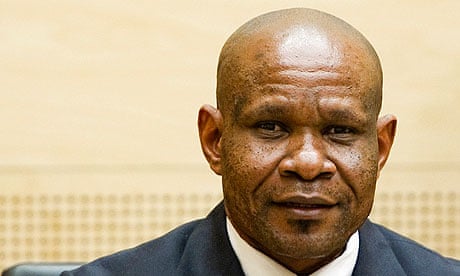A Congolese militia leader has been acquitted by the international criminal court, a setback that experts say sends a "worrying signal" about the court's ability to prosecute war criminals.
Mathieu Ngudjolo was accused of leading fighters who destroyed a village in the Democratic Republic of the Congo (DRC) in 2003, hacking to death and raping some 200 people including women and children.
But the ICC's prosecutors failed to link Ngudjolo to the atrocities, judges ruled on Tuesday. Their verdict was only the second in the court's history and leaves it with one conviction and one acquittal. Human rights groups said the victims had been denied justice.
The court in The Hague heard reports of victims being burned alive, babies smashed against walls and women raped in the village of Bogoro in the mineral-rich Ituri province in the east of the country. Prosecutors alleged that villagers were hacked to death with machetes.
Judges said the testimony of three key prosecution witnesses was unreliable and could not prove definitively that Ngudjolo led the rebel attack. The presiding judge, Bruno Cotte of France, said the decision was unanimous, and that witness testimony had been "too contradictory and too hazy".
But he emphasised that Ngudjolo's acquittal did not mean the court found that no crimes took place, "nor does it question what the people of this community have suffered on that day … If an allegation has not been proven beyond a reasonable doubt … this does not necessarily mean that the alleged fact did not occur."
Ngudjolo, who had claimed he only learned of the attack days later, showed no emotion as the not guilty verdict was handed down.
Eric Witte, an expert in international law at the Open Society Justice Initiative, said the judgment "will send a worrying signal about the quality of ICC prosecutions".
He said the chief prosecutor, Fatou Bensouda, may now need to rethink the way her office builds its cases. "A pattern of prosecution failures could undermine support for the court as a whole."
Rights organisations called on the ICC to explain the acquittal to survivors in Bogoro and improve its investigations.
"The acquittal of Ngudjolo leaves the victims of Bogoro and other massacres by his forces without justice for their suffering," said Geraldine Mattioli-Zeltner, international justice advocacy director at Human Rights Watch.
"The ICC prosecutor needs to strengthen its investigations of those responsible for grave crimes in Ituri, including high-ranking officials in Congo, Rwanda and Uganda who supported the armed groups fighting there."
Tawanda Hondora, deputy director of Amnesty International's law and policy programme, said: "This ruling undoubtedly will disappoint many victims, but it should only strengthen demands for justice in the DRC where impunity is pervasive and thousands of suspects have never been investigated or prosecuted by the ICC or national courts.
"With the completion of Ngudjolo's trial, attention should turn to the horrific abuses that are still being committed with almost complete impunity in eastern DRC today, including killings, rape and sexual violence in North Kivu province."
Judges ordered Ngudjolo's immediate release, but Bensouda said she would appeal against the verdicts and asked for him to be kept in custody.
While Ngudjolo was the first defendant cleared by the ICC, other war crimes tribunals based in The Hague and elsewhere have acquitted other suspects from conflicts in war zones, such as the former Yugoslavia.
Judges are still considering the evidence against another militia leader who stood trial with Ngudjolo, Germain Katanga, and are expected to deliver verdicts next year.
The court has indicted far more senior suspects than Ngudjolo, including the Sudanese president, Omar al-Bashir, and the former Ivory Coast leader Laurent Gbagbo. Bashir refuses to surrender to the court and Gbagbo is in custody in The Hague awaiting a possible trial.
The ICC has been criticised as being slow and cumbersome and for focusing exclusively on Africa so far. Its only other verdict, delivered this year, convicted another Congolese rebel leader, Thomas Lubanga, of using child soldiers in battles in Ituri. He was sentenced to 14 years in prison.
Toby Cadman, a barrister specialising in war crimes, said: "This is only the second verdict issued by the international criminal court. While it does not necessarily damage the reputation of the court it does call into question the credibility of the evidence relied on by the prosecutor's office once again.
"The Lubanga case was not without controversy in terms of the credibility of prosecution witnesses and once again we see the same concerns being raised. The judges have concluded that it was not safe to rely on such evidence in securing a conviction and rightly acquitted the accused. It will now be interesting to see what decisions are taken in the Katanga case which was severed from Ngudjolo recently, and in the Kenya case where similar allegations have also been raised."
Atrocities in eastern Congo continue. On Tuesday Oxfam warned that a million people were at risk as, with fighters positioned in and around the provincial city of Goma, they were left with little or no protection from the government or UN peacekeepers. "Millions of people are trapped … with no way of escaping what could be a ruthless and bloody confrontation," said Oxfam's humanitarian co-ordinator, Tariq Riebl.

Comments (…)
Sign in or create your Guardian account to join the discussion